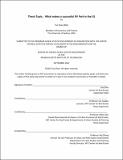Thesis Topic: What makes a successful RV Park in the US
Author(s)
Zhao, Yue (Mia)
DownloadThesis PDF (3.423Mb)
Advisor
Cookke, Jen
Saiz, Albert
Terms of use
Metadata
Show full item recordAbstract
Being creative looking for alternative investment in RV park rather than limiting in traditional commercial real estate sectors enabled Sun Communities REIT generated significantly higher profit for its shareholders in 2021. “The RV segment continues to deliver strong results producing same community NOI growth of nearly 31 percent in the quarter, as we benefit from the demand for outdoor experienced coming from existing and new Sun customers”, said by Sun Communities CEO, Gary Shiffman at Q3 2021 report.
Recreational Vehicle (RV) park campgrounds have been neglected investment opportunity for real estate developers and investors for a very long time due to the perception that campgrounds are lowincome accommodations. It is only recently that the product type is beginning to grab the attention of commercial real estate developers and investors. The most likely cause of this new attention is the enormous growth of the mobile work force and the attraction of the RV way of life since the onset of the COVID-19 pandemic. Investments in RV parks currently enjoy high cap rates, low maintenance costs and high growth potential- a nearly perfect combination for real estate investors.
The COVID-19 pandemic has had a considerable impact on travel over the past two years. While hotels and airlines have been negatively disrupted, campgrounds recorded record breaking busy years amidst and after the pandemic. In 2021, more than half of travelers planned to camp at some point during their trip. During the pandemic, camping accounted for 40% of all leisure travel. American RV ownership has reached a historical high point where many travelers could not find an RV to buy and also needed to book at a campground month in advance to order to secure a spot for their RV.
Many forward-looking real estate investors see opportunities in this traditionally mom-and-pop dominated industry and have more recently been attempting to step into this industry with the intention of increasing their revenue streams while syndicating these assets with their current land holdings. This thesis conducts a thorough study of the campground industry in North America to help equip a real estate developer with the necessary knowledge of the camping industry in order to provide guidance on making an investment in this asset class.
The methodology of the thesis includes a review of secondary sources from literature reviews; paid and unpaid industry reports from associations and governments; recent news and forums; and primary sources from field studies and interviews with private equity funds, architects, city planners, agents, and developers.
Date issued
2022-09Department
Massachusetts Institute of Technology. Center for Real Estate. Program in Real Estate Development.Publisher
Massachusetts Institute of Technology